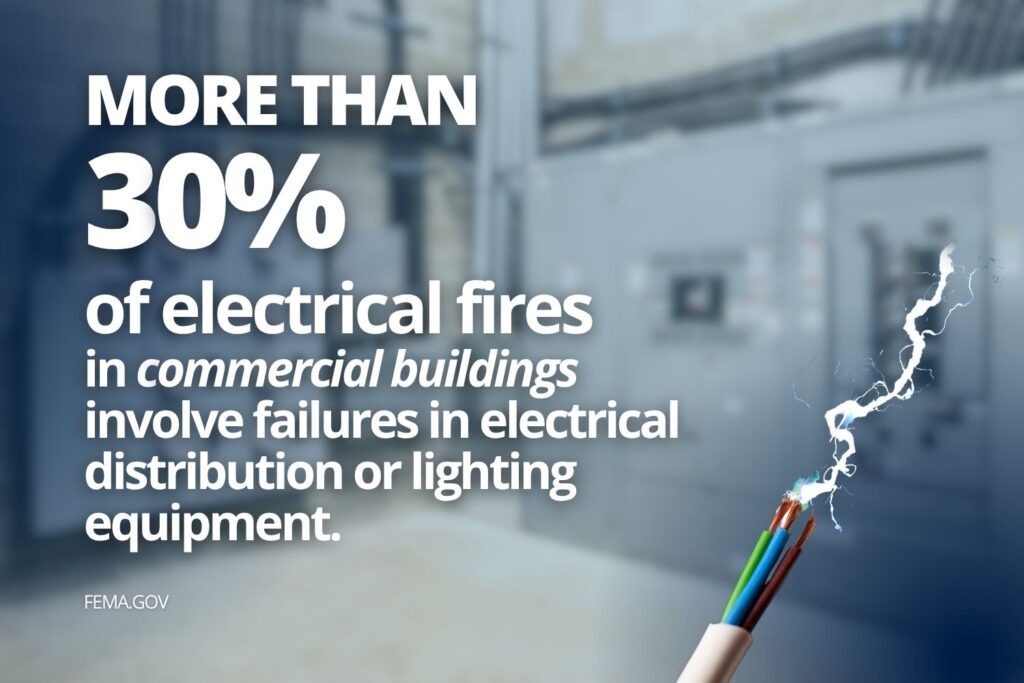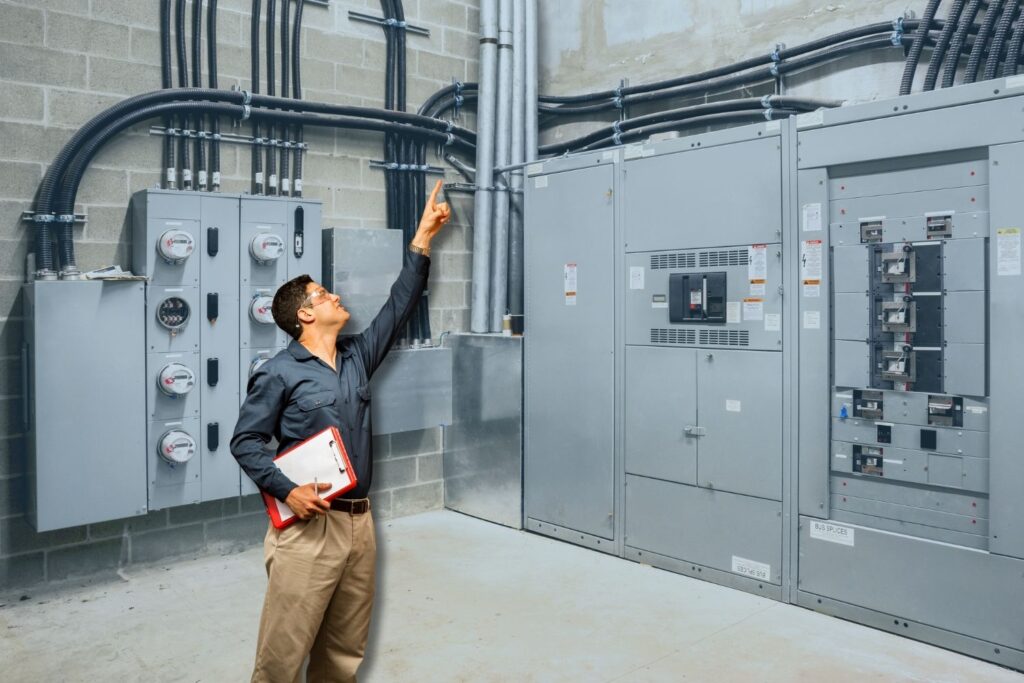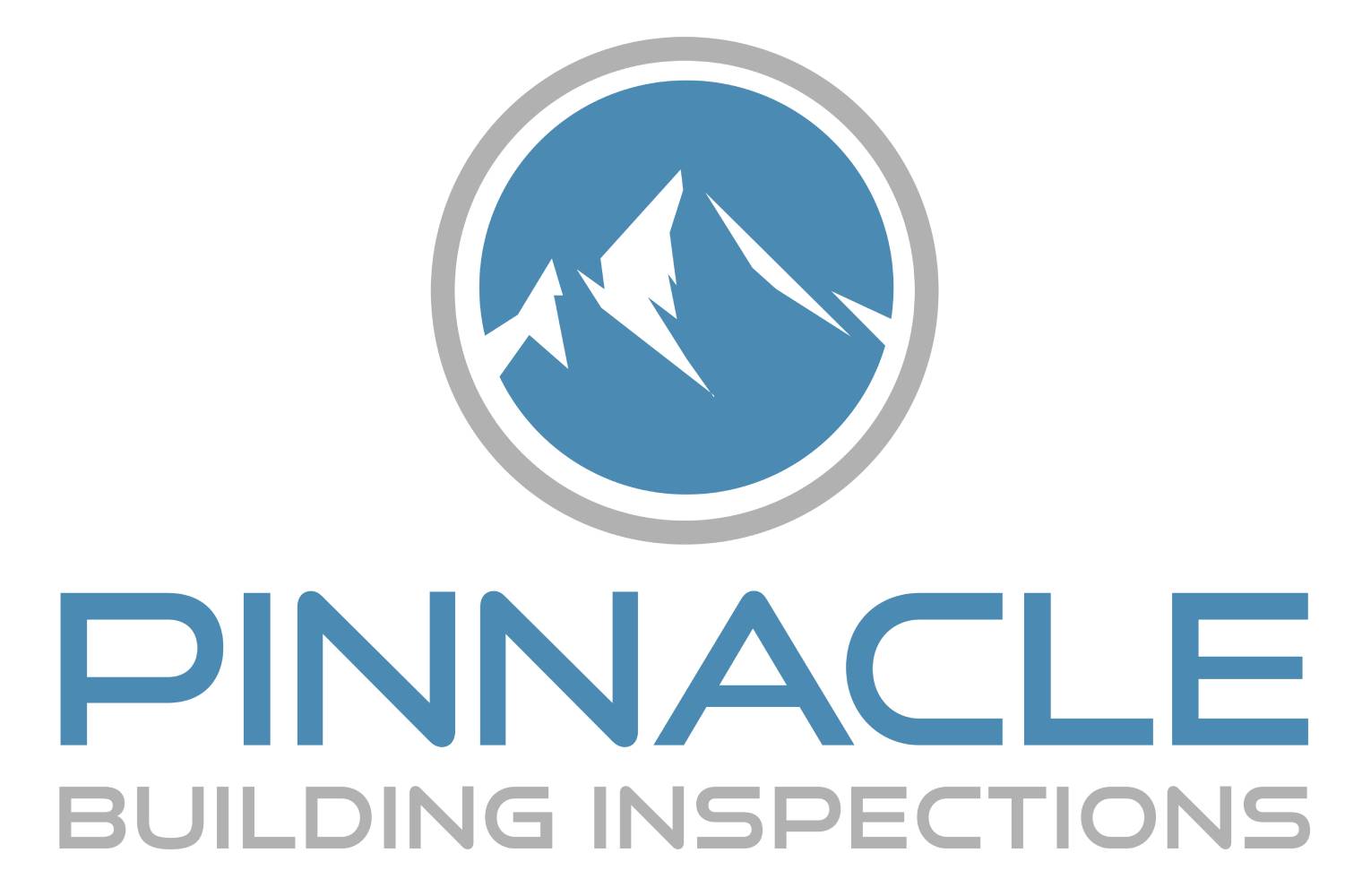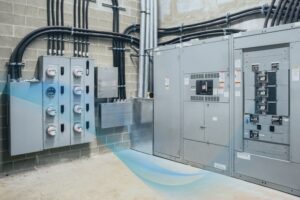An electrical room might not be the most visible part of a commercial property, but it is one of the most important. This space houses the systems that keep a building powered, secure, and operational. When electrical rooms are well designed and maintained, they protect people, property, and business operations. When they are neglected, they can pose serious risks.
At Pinnacle Building Inspections, we inspect electrical rooms in all types of commercial buildings across Arizona. Whether you manage an office, retail space, or industrial site, here’s what you need to know about electrical room safety and why it matters.
About The Electrical Room
An electrical room is a dedicated space that contains key components of a building’s electrical system. This can include panels, switchgear, transformers, backup power systems, and sometimes communication equipment. The room centralizes this infrastructure so it can be safely accessed, maintained, and protected from damage.
By code, electrical rooms must meet specific requirements for size, clearance, access, ventilation, and fire safety. These rules are designed to protect both the building’s systems and the people who work near or on them.
Why Its Condition Is So Critical
When electrical rooms are not maintained properly, the consequences can be serious.
Electrical failures are a leading cause of commercial building fires, according to the National Fire Protection Association. Beyond fire risk, poor electrical room conditions can lead to outages that disrupt business operations, damage equipment, or even result in injuries.
Well-maintained electrical rooms, on the other hand, support reliable power and safer conditions. They also help property owners avoid liability and meet insurance requirements.

What Inspectors Look for in Electrical Rooms
During a commercial property inspection, we focus on both the condition and safety of the electrical room. Some of the key things we check include:
• Clear access to panels and equipment. Blocked panels can slow down emergency responses and create hazards.
• Proper labeling of circuits and equipment. Labels help ensure safe operation and faster troubleshooting.
• Signs of damage or wear. This includes corrosion, discoloration, or burned areas that suggest overheating.
• Moisture or leaks. Water and electricity do not mix. Even small leaks near electrical equipment are a concern.
• Ventilation. Good airflow prevents overheating of electrical components.
• Secure covers and panel doors. Open or missing covers expose live parts, creating shock and fire risks.
We also look at general housekeeping. Electrical rooms should never double as storage spaces. Boxes, supplies, or tools stacked in these rooms can block access or increase fire risk.
Many of the issues we report could have been avoided with routine maintenance. Some of the most frequent concerns include blocked or cluttered spaces, missing or broken labels, unsecured panel covers, and poor lighting.
Another common problem is water intrusion. Even small roof leaks or nearby plumbing issues can allow moisture into an electrical room. Left unaddressed, this can lead to corrosion, equipment failure, or electrical faults.
Clearance violations are also frequent. Electrical codes generally require at least 36 inches of clear working space in front of panels. When this space is blocked, it makes maintenance dangerous and can violate both code and insurance terms.
What Property Owners and Managers Can Do
Keeping an electrical room in good condition is not complicated, but it does require consistent attention.
• Make sure the space stays clear of clutter. It should never be used for storage.
• Check that all panels and equipment are labeled clearly.
• Schedule regular maintenance by licensed electricians.
• Address leaks, water stains, or moisture right away.
• Keep the room clean and well-lit.
Good electrical room practices also support insurance compliance. Many insurers look at electrical system condition when setting premiums or coverage limits.
Electrical Room Condition and Property Value
A clean, code-compliant electrical room reflects well on how a building is managed. Buyers and investors see it as a sign of responsible ownership. During sales or financing, electrical room deficiencies can lead to requests for repairs, credits, or even delays in closing.
In addition, lenders or insurance carriers may require that electrical issues be addressed before a deal is finalized. Taking care of these concerns before listing or refinancing helps transactions move smoothly.

When to Bring in a Pro
While inspectors can identify concerns, repairs and upgrades should always be handled by licensed electricians or electrical engineers. You should bring in a specialist if you notice:
• Strange odors, heat, or buzzing sounds coming from panels
• Signs of water near electrical components
• Frequent tripped breakers or power fluctuations
• Damage to covers, conduit, or wiring
• Difficulty understanding or tracing unlabeled systems
A professional can assess whether repairs or upgrades are needed to meet safety standards and support reliable building operations.
Questions Clients Often Ask Inspectors
Does my electrical room need to meet today’s code if the building is older?
Existing rooms are typically grandfathered in, but any updates or repairs must comply with current code. We will flag safety issues or code gaps that could be addressed.
How much clearance is required around electrical panels?
Most codes require at least 36 inches of clear space in front of panels, with proper side and head clearance as well.
Is it okay to store supplies in an electrical room?
No. Electrical rooms should not be used for storage. Doing so creates fire risks and can block access in an emergency.
Can electrical room issues affect insurance or a sale?
Yes. Safety concerns can lead to higher premiums, coverage limits, or conditions from lenders or buyers that repairs be completed before closing.
Conclusion
The electrical room is the heart of a building’s power system. Keeping it safe, clean, and compliant protects people, property, and business continuity. Whether you are managing a property, preparing for a sale, or buying a new building, a professional inspection helps identify concerns before they become major problems.
Pinnacle Building Inspections provides detailed reports to help you make informed decisions and plan with confidence.

